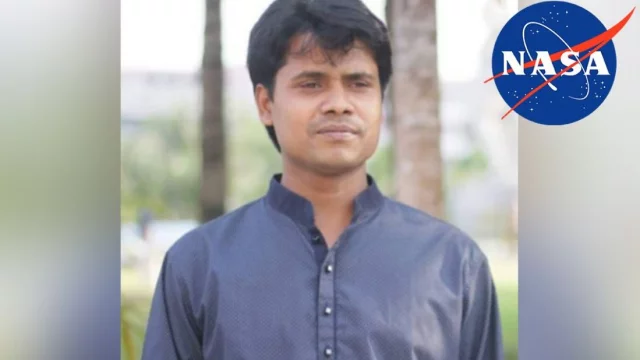

One of the four members of a team contributing significantly to a National Aeronautics and Space Administration (Nasa) initiative aimed at growing plants in space is a man from Bangladesh named Muhammad Tarikuzzaman. Tarikuzzaman’s group from NASA’s “La Tech Biomass,” investigates cutting-edge techniques for growing plants under the special conditions of space.
Born in a village of the Sandikona Union in the Kendua Upazila of the Netrokona district, Mohammad Tarikuzzaman is a PhD student at the College of Engineering and Science at Louisiana Tech University.
His father, the late Momtaz Uddin, and mother, Maleka Khatun, raised him alongside five sisters and three brothers, making him the youngest among the boys.
In a conversation on WhatsApp, Tarikuzzaman confirmed his involvement in the Nasa research team.
“Currently, Nasa’s ‘La Tech Biomass’ team is researching unique ways to grow plants in space. We are exploring the possibility of cultivating agriculture in space using human urine instead of soil. Our team is also thinking of discoveries with innovative projects.”
Tarikuzzaman, is one of the four members of a team making significant contributions to a National Aeronautics and Space Administration (Nasa) project focused on growing plants in space.
Tarikuzzaman’s team from Nasa’s “La Tech Biomass,” explores innovative methods for cultivating plants in the unique environment of space.
Born in a village of the Sandikona Union in the Kendua Upazila of the Netrokona district, Mohammad Tarikuzzaman is a PhD student at the College of Engineering and Science at Louisiana Tech University.
His father, the late Momtaz Uddin, and mother, Maleka Khatun, raised him alongside five sisters and three brothers, making him the youngest among the boys.
In a conversation on WhatsApp, Tarikuzzaman confirmed his involvement in the Nasa research team.
“Currently, Nasa’s ‘La Tech Biomass’ team is researching unique ways to grow plants in space. We are exploring the possibility of cultivating agriculture in space using human urine instead of soil. Our team is also thinking of discoveries with innovative projects.”
Tariq expressed his hopes for the future: “I seek everyone’s prayers for such research and my future endeavors. This honor is not only for our family but also for our country. As a scientist, I aspire to contribute to enhancing Bangladesh’s reputation and honor in global research.”
Family members said that Tarikuzzaman completed his education at Sandikona Cluster Model Government Primary School and graduated from Sandikona Higher Secondary School in the science division in 2007.
He completed his higher secondary education in science at Mymensingh Agricultural University College in 2009 and earned a Bachelor of Science in Electrical and Electronic Engineering from Khulna University of Engineering and Technology in 2014.
After completing his education, Mohammad Tarikuzzaman worked as a senior engineer at Energypac in Dhaka from 2015 to 2020. He later moved to the United States on a scholarship.
Tarikuzzaman has had a strong interest in electrical and electronic engineering since childhood. He is currently pursuing a Master of Science in Electrical Engineering (2021-2023) and a PhD in Micro and Nanoscale System Engineering (2021-2025) at Louisiana Tech University.
Regarding his achievements, his high school teacher, Mohammad Zahiru Islam, said: “From his student life, Tarikuzzaman was very intelligent and determined. He never compromised on his studies and has left his mark in every field. I wish him success.”
Tarikuzzaman’s older brother, Jilu Mia, expressed pride in his younger brother’s accomplishments.
He said “We are very happy and proud of my younger brother’s achievement. This honor is not just for our family, but also for our country. We expect him to enhance Bangladesh’s reputation and honor as a scientist through his research.”
In this regard, the local Kendua Upazila Nirbahi Officer (UNO), Imdadul Haque Talukdar, said: “Mohammad Tarikuzzaman, a talented child of the fertile soil of Kendua Upazila, has been appointed as a Nasa researcher. I wish him all the best in his future endeavors.”